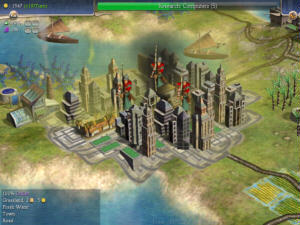Friday 4 November 2005

|
Pic of the day: Random screenshot from a city in Civ4. As you can see, even without opening the city screen you can get an impression of the city: It is technologically advanced but dirty and defended by a medieval type army. Civilization IVNovels be darned, mended or otherwise repaired at some later time. "The defense of our cities takes precedence!" Actually that's a quote from Civ2, from the military adviser. I can still remember many of their pitches, not least the military guy with his colorful metaphors. "Would you defend our cities with haystacks, noble leader? Build barracks first and other city improvements later!" "We stand astride the world like a colossus, noble leader! Let us send forth our mighty armies, that they may sheathe their swords in the beating hearts of our enemies!" Stuff like that. These guys don't have voice actors in Civ4, but of course they still have their opinions if you care to ask them. This is the nature of the Civilization series, it is cumulative. Each new version adds to the earlier. And yet ironically some of the best changes in Civ4 are removals. OK, that needs an explanation. ***Civ2 was already a pretty big and complex game which took days to play through from beginning to end. With Civ3 came important new gameplay concepts: Culture, borders and strategic resources. These were connected: Culture caused the borders to expand, and you had to get the strategic resources inside your borders to make more than the simplest military units. Iron, coal, oil, uranium... Just like in the real world, wars were fought over these things. As a result, the games now were so long and required so much micromanagement that I never played one of them through to the end. And I consider myself a "fan" of the game. In Civ4 there are even more features. Religion is now important to happiness, production and not least foreign relations. Great People arise from time to time and change the course of history to some degree. There are now tradeable food resources in addition to minerals and luxuries. Government now has 5 different components that can be mixed and matched. And yet the game is easier, faster and more fun to play! How did that happen? Mainly the game has cut down on micromanagement, or at least made it unnecessary at all but the very highest difficulty levels. (And there are now 9 of these, should be something for everyone!) Pollution has been replaced by a generic "health" of the cities: Smokestack industry reduces health, good water supply and recycling increase it; jungles reduce health in nearby cities, forests increase it. There are many factors that influence health, from your type of government to choosing hydropower over coal. These things happen in the background, and your cities grow faster or slower, without any big ugly blotches on the terrain. You live or die by the sum of your policies, not by having workers chase the blotches. The artificial intelligence of your workers is much improved. All but the most astute of players should consider automating the workers, although there are so many new options that it is now fun to micromanage them for a while. Likewise the city governors are perfectly capable of assigning people to the various tasks, once you have found a good position for your city in the first place. Your decisions are the big ones, like do you want the city to be an industrial powerhouse, a bread basket or a culture spearhead? And finally, diplomacy makes sense. The leaders have personalities, and they have memories. You can inspect those and find out why they act like they do. For instance, if your neighbor is a peaceful and spiritual leader and you have treated him well, there is no need to plan for his invasion of your country, as unavoidably happened in earlier games. If a more dubious character lives nearby, you may need to be prepared, but you can usually see it coming as he regards religious differences as a grave offense and resents you trading with his opponents. It is possible to play through the whole game without ever going to war. I did with my two first games. And yes, they took less than a day. Game speed in the late parts of the game are much improved. Avoiding war will help speed up the game as there is still no way to automate military units completely. Of course if you enjoy the war part, you can pick your own wars, or even select "always war" from the setup screen... ***You can find many more detailed reviews on the Net, most of them ecstatic. I largely agree. It bears mention, however, that the much hyped built-in multiplayer support is a bit untested. Hotseat mode is severely broken, as the civilizations assigned to the AI are not being played by the machine but rather are still asking you to make their moves. And in the first LAN game I played on my home network, I had the game set up for 5 civilizations but the machine filled out to the max for the map, 8 in that case. Not welcome. I suppose the Internet play has been actually playtested, so probably works. All in all, however, Civ4 is without any reservation the greatest strategy game for Windows, ever. At least until Civ5, I suppose... |
Yesterday <-- This month --> Tomorrow?